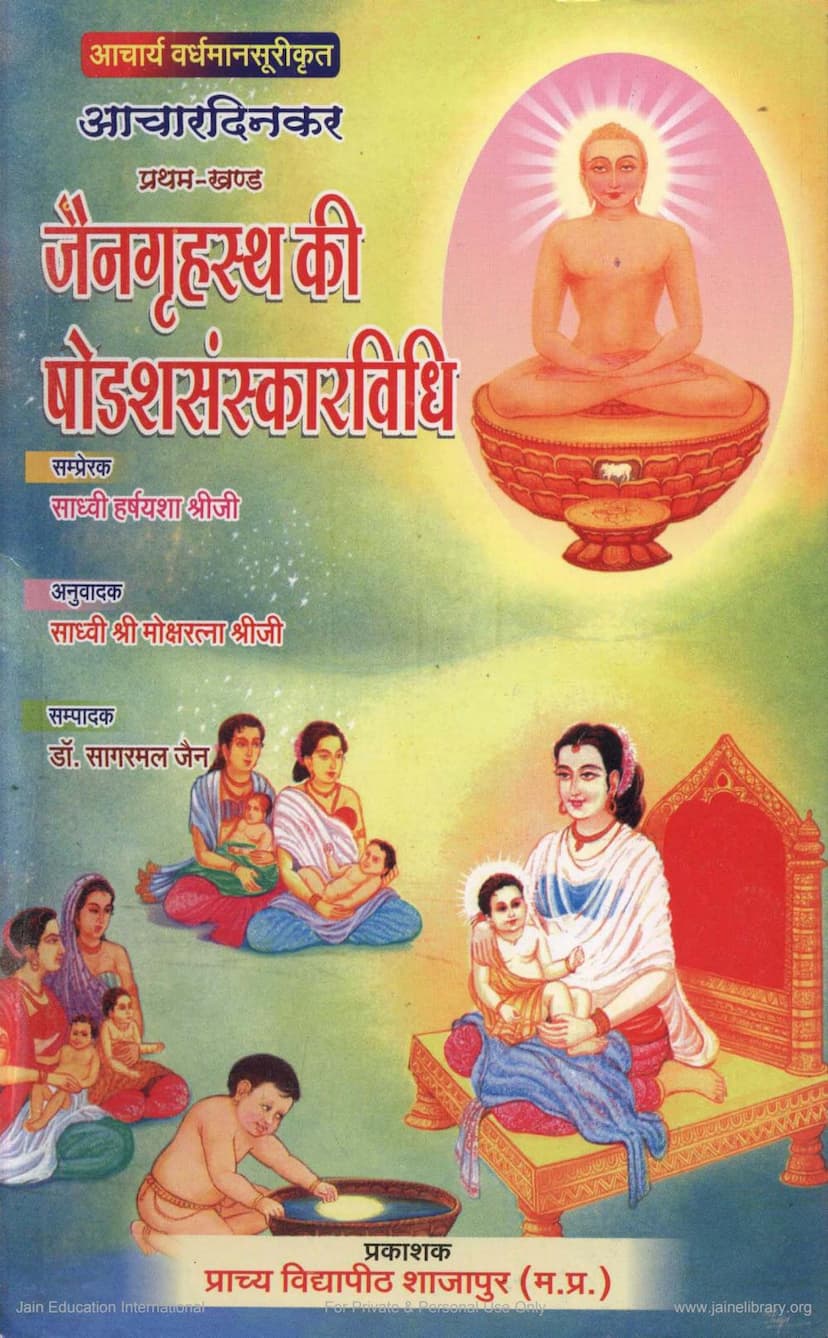Jain Gruhastha Ki Shodashsanskar Vidhi
Added to library: September 2, 2025

Summary
This Jain text, titled "Jain Gruhastha ki Shodashsanskar Vidhi" (Jain Householder's Sixteen Sanskar Rituals), is the first volume of "Acharadinkar" (The Sun of Conduct), originally authored by Acharya Vardhmansuri and compiled/translated by Sadhvi Moksharatna Shri Ji, under the editorship of Dr. Sagarmal Jain. Published by Prachya Vidyapith Shajapur, it is dedicated to the principles of Ahimsa (non-violence), Anekant (multi-faceted reality), and Aparigraha (non-possession).
The book delves into the sixteen samskaras (rites of passage) prescribed for Jain householders according to the Acharadinkar, a significant work in Jain tradition. The text highlights the importance of samskaras in refining the mind and spirit, thereby shaping a cultured and virtuous individual and society.
Key aspects covered in the text:
- The Significance of Samskaras: The book emphasizes that samskaras are foundational to a glorious culture, shaping the mind and consciousness, and are initiated even before birth.
- The "Acharadinkar" by Acharya Vardhmansuri: The text presents the first volume focusing on the sixteen samskaras for householders, as detailed in Acharya Vardhmansuri's comprehensive work. This work, originally in Sanskrit and Prakrit, is considered a seminal text on Jain rituals and is still widely referenced in the Shvetambar tradition.
- The Sixteen Samskaras for Householders: The book meticulously outlines and explains the rituals associated with each of the sixteen samskaras, starting from conception (Garbhadhan) and continuing through birth (Jatakarma), naming (Namkaran), up to the final rites (Antya Sanskar). The individual samskaras covered include:
- Garbhadhan Sanskar (Conception Ceremony)
- Pumsavan Sanskar (Ceremony to ensure male offspring)
- Janma Sanskar (Birth Ceremony)
- Surya-Chandra Darshan Sanskar (Sun and Moon Viewing Ceremony)
- Kshirashan Sanskar (First Milk Feeding Ceremony)
- Shashthi Sanskar (Sixth-day Ritual)
- Shuchikarma Sanskar (Purification Ceremony)
- Namkaran Sanskar (Naming Ceremony)
- Annaprashan Sanskar (First Solid Food Ceremony)
- Karnavedh Sanskar (Ear Piercing Ceremony)
- Chudakaran Sanskar (Hair Tonsure Ceremony)
- Upanayan Sanskar (Initiation Ceremony, including the thread ceremony)
- Vidyarambh Sanskar (Beginning of Education Ceremony)
- Vivah Sanskar (Marriage Ceremony)
- Vrataropan Sanskar (Vow-taking Ceremony)
- Antya Sanskar (Final Rites)
- The Author and the Tradition: The text provides a detailed account of Acharya Vardhmansuri, a disciple of Abhaydev Suri of the Rudrapalli branch of the Khartargachha tradition, who composed the Acharadinkar in 1468 VS (1412 CE) in Jalandhar. It also traces the lineage of the Rudrapalli branch, highlighting its influence in Western Uttar Pradesh, Haryana, and Punjab.
- Influence of Other Traditions: The author acknowledges the influence of Hindu traditions on the concept of sixteen samskaras in Jainism, while also emphasizing the Jain adaptation and incorporation of these rituals with Jain mantras and principles.
- Practical Guidance: The book offers practical instructions for performing each samskara, including auspicious timings, necessary materials, mantras (often presented as Jain Vedic mantras), and the roles of the officiating priest (Grahstha Guru/Jain Brahman/Kshullak) and family members.
- The Translator and Editor: The translation and commentary are highly appreciated, particularly by Acharya Kailash Sagar and Jainand Muni, who laud the effort in making this ancient text accessible to a wider audience. Dr. Sagarmal Jain's editorial contribution is also acknowledged for ensuring the accuracy and clarity of the translated text.
- The "Acharadinkar" Structure: The original work is divided into forty sections (uday), with the first part covering sixteen householder samskaras, the second part sixteen monk samskaras, and the third part eight common rituals for both householders and monks.
- The Translator's Humble Approach: Sadhvi Moksharatna Shri Ji expresses humility regarding her translation, acknowledging potential errors due to the original text's condition and her own limitations, and seeks forgiveness from the learned community.
- The Legacy of the Donor: The book is dedicated to the memory of Shri Gulabchandji Phoolchandji Jhadchur, highlighting his piety, simplicity, dedication to Jainism, and his contribution to promoting religious literature. His family's continued support for religious publications is also noted.
In essence, "Jain Gruhastha ki Shodashsanskar Vidhi" serves as a comprehensive guide for Jain householders, detailing the samskaras that mark the significant stages of life, ensuring that these transitions are observed with appropriate rituals, ethical conduct, and spiritual awareness, guided by the principles of Jainism.